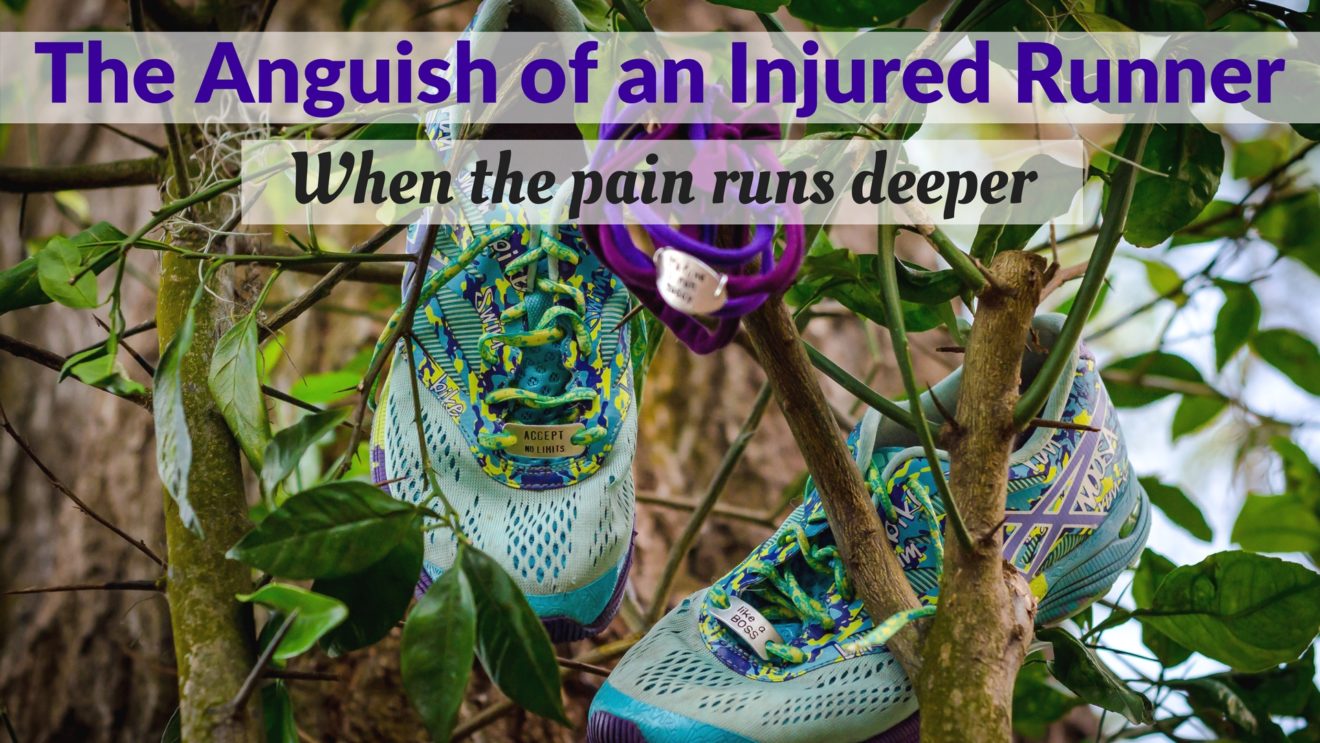
The Anguish of an Injured Runner
This is an account of my personal experience of dealing with the psychological and emotional impact of a running injury. I am not a professional and do not offer any advice or recommendations. I won't sugar coat it. It hurt to spend a few months as an injured runner.
My aim in writing this is to remind others struggling in a similar situation that you are not alone. You are not strange, crazy or obsessed and you don’t have to put on a brave face every day and pretend everything is just fine. It’s not. For a while, anyway.
Every morning, six days a week, my alarm would go off at 4:30 am and I’d bolt out of bed and get into my running clothes before my brain was functioning sufficiently to prompt me that this kind of behaviour on a voluntary basis is crazy. No hitting the snooze button. Believe it or not, I’m not a morning person.
A few swigs of electrolyte drink and a ten minute warm-up and I was off for a nine or ten mile run. Fridays became long run day and I would cover more miles. How many more? That depends on whether I’m training for anything, and where I was in the program. Between eleven and fourteen miles is a ‘short-long’ run and anything over 14 counts as a long run. If there was no race deadline, I’d just run as far as I wanted, come home, take a shower and start my day.
“Damn, but you’re committed to this!” The words came out of a dimly lit driveway at the top of my street long before sunrise on a crisp December morning. I squinted in the darkness to see a neighbor about to leave for work. I smiled.
“Pretty much,” I said, as he shook his head with a comical mix of curiosity and disbelief. “It’s kind of addictive.”
“Why?”
I giggled. “It makes me happy.”
I could hear him chuckling behind me as he got into his truck and knew that he thought I was crazy.
Running became the launch pad for my day; my own time to process my thoughts, think about my family, friends, make plans, solve problems … It was also where I delved into my energy bank that would carry me through the rest of the day.
I don’t have to run. I choose to run. I’ve built my life around running. My social circles, new friends, the articles I read, the media that interests me … Pretty much everything in my life now, aside from my husband and family, are based on my love of pounding the asphalt. Imagine what would happen if I didn’t have this. Actually, I couldn’t. It was beyond what my mind could contemplate.
And It All Came Crashing Down
Then the unthinkable happened. I couldn’t do it anymore. Just for a couple of months; months that felt like an eternity. And just like that, my whole world stopped. I was the injured runner.
If you are a runner, or involved in any kind of physical fitness, chances are you’ve been sidelined by injury at least once.
Often these setbacks can be avoided; sometimes they are just bad luck. But how they happen is almost irrelevant when the days tick by into weeks, which sometimes even turn into months and you mourn the loss of the routine that has been a major part of your life.
After running pretty much every day for almost 18 months without any injuries, the possibility of not being able to go out for my morning run didn’t really occupy much time in my mind. It was something that only happened to other people. Not me. I am very disciplined when it comes to making time for my warm-ups, strength training, mobility and stability work, running drills … you name it, I will do it if it makes me a better and healthier runner. I can't be a injured runner. Not this girl.
I started running shortly after moving to a new area and I didn’t know anyone. Getting out every morning was a great opportunity to get to know people in the neighbourhood, on the running and cycling trails nearby and, as I started running longer distances, in other neighbourhoods as well.
It was one of the highlights of my day and I have met so many lovely people. Many of them don’t run. Some are avid walkers. Others like to take their dogs out for a walk before it gets too hot and yes, if I’m not doing a dedicated training workout, I will occasionally stop and speak to them because they are part of my run.
I know the name of almost every dog that frequents my running routes (and the names of most of their owners). I love dogs.
And so my social circle was born and grew out of my running.
Shut the World Outside and Lock the Door
So what do you do when the routine and lifestyle you’ve worked hard to build gets pulled out from under your feet? Where do you go? Nobody seems to understand.
Non running friends don’t get it. How could they? They think you’re nuts to run so much and drop subtle hints that you probably ran too much anyway and some time out will be good for you.
Well-meaning people try to make you feel better by saying things like:
“The break will do you good.” Or, “I’m surprised you haven’t been injured sooner. All that exercise can’t be good for you. You’ll waste away.”
“You’ll be back to it in no time.” Really? How do they know?
Or the guy who spotted me walking early one morning with a compression sleeve on my knee who responded to my good morning greeting with a vague gesture towards my knee as he commented, “Hmm. See that’s why I don’t run.” I’m sure he was trying to be friendly and make small talk, but he hit a nerve. Without saying the words, he saw me as an injured runner. I glared at him, deciding silence would be the most appropriate response to his remark.
I’m sure they mean well, but it’s hard to receive the comments they way they are probably intended and if anything, for me, they just made me want to avoid people in general even more. Shut them out. They really don’t get it.
So what about your running buddies? They do get it and they are there for you to offer suggestions, support and advice. But after a while you don’t feel like you are part of the group anymore. The one thing that you have in common with all of them is that you run. Except now you aren’t running and you have no idea when you’ll be back on your feet again. You're an injured runner. For now, you're out.
This had nothing to do with my fellow runners, but everything to do with my perception of the world that suddenly seemed full of healthy runners. And then there’s me. Excluded. Not by them, but by myself because I don’t feel like I belong there right now and I sure don’t want to be here.
Some kind of disconnection takes place because you’re not in the game. It feels like you’re the only spectator. Nobody else is sitting with you to share popcorn and watch from the bleachers. So slowly you slip away from the communities and sometimes even avoid them because you get tired of having to tell everyone who asks, “No, I’m not any better. I’m still injured and no, I have no idea when I’ll be back.”
My Injury Grief Cycle
One thing I’ve learned, not only from my own experience, but from comments dropped by others who are sidelined for a season is that running injuries start in the body, but they eventually seep through to your head. It becomes a mental battle.
I found it worse than the mental strength needed to get through a long or tough workout. Why? After your workout you have a sense of accomplishment. It’s brain training; or as I like to call it, my investment in The Bank of Awesomeness. I am capable of more than my mind wants me to believe and I just proved it.
That works very well in training. When I was running. Somehow trying to find the mental toughness to stay positive when things were getting worse, not better, wasn’t as easy. In fact, it eventually proved impossible for me. I was mentally worn out and my one outlet – running – wasn’t there to help me out of this.
Dismissal
If you’re seriously committed to exercise and fitness, something always hurts. It will go away. I mean, it always has in the past.
Although I’d never had an injury that took me off the road, I’ve had my share of aches and pains from pushing my body hard through training. The first thing I do is to locate exactly where the pain is and then to find out what weaknesses could be causing the discomfort.
I would run through it while working on strengthening, stretching and rolling the problem areas and whatever was bugging me always cleared up.
Not this time.
I ran a marathon a week or so before the pain started to hint that something was wrong. Perhaps I would have picked it up earlier, but I didn’t do too much the week after because I wanted to give my body a chance to recover. I was being careful. I didn’t feel that bad after running 26 miles and I’d been well prepared for the distance. So this was just fatigued, sore muscles that needed a longer rest.
I showed up at the start line well trained and although nervous – it was my first – I felt securely wrapped in a quiet confidence that I had worked hard for this and everything was going to be just fine. I had trained for a much harder race than I intended to run and I stuck to my plan and ran easy. I really thought I’d be fine.
But 10 days later that stiffness down the left side of my body was throwing out some lower back pain, hip pain and a hamstring and knee that really hurt after about five miles. I thought I should be sensible and just take it easy for a few more days, added in some extra foam rolling and deep stretches and threw in some mobility work to round it off nicely. I mean a foam roller will fix anything, right?
I actually rolled the top of my quad above my knee so aggressively that it became angry and inflamed and hurt to touch. So the foam roller was put safely out of reach for a few days and the ibuprofen and ice came out to replace it for a while.
Denial
All the same, I knew my body had been through a lot with the marathon. I didn’t think it was a running injury. As I said, I felt pretty good afterwards. I took a few more rest days, paid careful attention to my nutrition and made sure I diligently worked on those tired muscles to speed up recovery. The runs would start out just fine and I thought everything was getting better; so I kept trying to push through the miles.
But each time I set out the pain got worse and every day the onset was sooner. The worst of it seemed to be concentrated in my left knee. It was like being stabbed repeatedly with a sharp knife. I will run through pain. Most of us do. We train to tolerate it for those times we need to push through. But this was not training pain. It was stopping my runs early.
Now what? I had a great idea. Let’s panic.
I’ve got another race coming up. I don’t want to take yet another week off.
Acknowledgement
Something is wrong. Let’s go get it checked out. I was determined to just push through this. Aches and pains eventually subside. But sharp, shooting pain that made my knee buckle and took me to the ground a couple of times was the final signal (yes, it took me that long) that this wasn’t a tired body or overworked muscles that needed a rest. I wasn’t managing to fix it myself and I needed help.
I don't want to think it it. I don't want to say it. I'm an injured runner.
Self Blame
Perhaps I’m just not cut out for marathons. This thought made me sad, because I loved training for the distance. I love long runs and enjoyed the challenge.
I must have done something wrong. Well, perhaps I did. One thing I did know for sure was that it was not a result of slacking off or lack of diligence in training and ensuring good recovery. So I must have done something wrong.
It didn’t take long for me to point straight at the marathon course. This was by far one of my greatest achievements. Running a marathon became one of the things I regretted the most. I wished I hadn’t done it. At least, not that particular one. It turned me into an injured runner.
The race itself was great. I had a wonderful time. But multiple loops, leaning on a left hand turn on cambered wet, slick surfaces in unseasonably cold weather for 26.2 miles probably wasn’t the smartest thing to do.
Frustration, Sadness and a Touch of Anger
I’ve been doing everything I’m being told to do and it’s not getting better.
In fact, it was rapidly getting worse.
Will I ever run again? I mean, I know I will eventually heal up, but do I want to go through this again? And do I want to sit around feeling like I’ve lost my purpose indefinitely, or should I just ditch the whole running thing and find something else to do?
Perhaps it was time to seriously consider just finding another hobby. I took a trash bag, rounded up all my medals, bibs and awards and dumped them out in the garage. I didn’t want to see them. I wanted to avoid reminders of the good times I had running because it just made me feel worse. Seeing them just made me feel like an injured runner.
I was angry with everything; I was angry with my medals; I was angry with races because some of them don’t offer transfers, deferrals or refund options. Note to self: Check carefully before signing up for events. That good price six months out is not so good if something goes wrong and they don’t offer a transfer or deferral option.
Can Anyone Fix My Running Injury?
Finding the right person to diagnose the problem was probably even more frustrating than not being able to run. Stay with me here. I am not kidding. Once I had a diagnosis, a treatment plan and some hope I was finally able to accept that this is temporary and I will be running again.
Before that, I saw several professionals. I first went to a chiropractor. I’ve had success with chiropractors in the past and felt it would be a good place to start. I had some realignment done, Graston Therapy on my IT band and sports massages. You may want to look up Graston Therapy. It’s a form of manual therapy performed with a metal tool that penetrates deep into the tissue.
I was treated very well there and the people who worked with me were lovely. There was definitely a lot of tightness in my IT band, which came as no surprise.
Strangely, I felt comforted being told that I was not the first person from this particular marathon to come in with a left side injury. I was optimistic.
I Did Everything I Was Told To Do
I worked diligently at home to do my stretches, strength and mobility work.
The pain got worse. Instead of being able to run about 5 miles, within a few weeks I could barely manage half a mile before I was in so much agony that I had to shuffle back home as sharp, searing surges shot down from my lower back, through my hamstring, IT band and into my knee and upper shin.
I was starting to develop an uneven walk, too. That was another thing. Walking hurt a lot and turning over in bed was not exactly a pleasant experience.
It Just Keeps Getting Worse
I hadn’t even made it out the door. It was a Tuesday morning. I was dealing with a lot of pain and just wanted some relief. Anything to make it go away.
The wait to see a doctor was around two weeks and I needed something now, so I made an online appointment to go to the nearby Urgent Care Center. I’ll cut out the first 40 minutes of the experience just trying to get checked in. I had to wait another 20 minutes for the doctor because the nurse who checked me in had gone to call a doctor who specializes in sports medicine and works with athletes. It would have been nice if she had mentioned this when she closed the door behind me and left me sitting on a little chair in the corner of the room waiting and waiting.
The doctor was nice enough. He checked my mobility and strength, examined my leg and told me it was definitely just a tight IT band. I explained that I had stopped taking Ibuprofen because masking the pain wasn’t helping me locate the source. That was not his view. He also disagreed with my dislike of applying ice.
I told the doctor I don’t believe it is helpful, but didn’t like that.
He wrote out a prescription for a week’s course of anti-inflammatory medicine for $15 and that was the last I saw of him.
Later that evening I was waiting to put some items in the shopping cart at the grocery store and recognized the medical name for the prescription I’d been given. (We had already paid and collected it). Over the counter, common old Aleve. By the way, it would have cost us five bucks if we had thrown it into the cart there and checked out. I was so furious it would have been helpful if there were sedatives on the shelf there.
I continued with the course and finished it, and still had no relief.
That's It. I've Had Enough!
By now I was getting angry. I had not exactly been treated courteously at Urgent Care and left a scathing review online. That had also been the most expensive appointment through this ordeal and the biggest waste of time.
Walking hurt, running was out of the question and just getting around the house was becoming difficult. How had I gone from running a marathon a couple of months before to struggling to get from one room in the house to another?
I called the spinal clinic again and left a message for the lovely lady who had seen me the first time. My call was returned by a girl at reception who had passed the message to someone else and stated that I had been given instructions to cease all strength training and activity. I asked her to clarify, because this was the opposite of what I’d been told on my last visit.
Nope. I was a bad girl. It was on the notes, she told me. No strength training at all. The end.
Strange. I left another message. Again, my call was returned by the receptionist who said that they could order an MRI for me. I felt like I was being blocked from reaching the person I wanted to speak to and I wasn’t going to beg them to keep me on as a patient.
Why bother? I just wanted to speak to the person who had my initial file, yet it seemed that getting a message through was going to burn more calories than I cared to share.
It was time to step away from all things related to running for a while. Maybe I would be back. Maybe I wouldn’t. I started looking into body building and other fitness challenges to divert my attention.
It had reached the stage where not being able to run was consuming me far more than running ever did.
Is Injured Runner Depression a Thing?
Looking back on this seemingly endless ordeal, what surprised me most was the impact my injury had on my emotions. Instead of eating, sleeping and breathing miles, I became obsessed with not being able to run. I thought about not running more than I thought about running.
I kept seeing runners outside. They were everywhere. Where did they all come from? I was sure we didn't have that many people going for a run when I was training.
My mind tormented me. My emotions followed.
There are plenty of theories and studies out there showing how lack of exercise affects the mood. I didn't need to read them to know it was true. But I it wasn't going to help and I didn't care.
I lost interest in doing things. I had a “don't care” attitude, no energy and felt irritable and lethargic.
Weight gain is a common concern for an active person who suddenly ceases all activity. This was never a worrying factor for me. I was worried about losing all my fitness; fitness that I'd spent a long time consistently building up. Taking a week or two off doesn't really have a negative impact. The worst that happens is you feel a bit sluggish for the first few workouts when you get back to it.
I didn't want to throw it all away, but as the weeks ticked by I also knew that the effects of my hard training were slipping away. And there was nothing I could do about it.
Everything felt like a big deal. It was an effort to get up and do anything. I didn't care about what I ate. In fact, I didn't bother to eat very much in the latter part of my time off. My appetite was gone and it was a chore to drop what I was doing to prepare food. Only, I wasn't really doing much of anything. Still, it was more trouble than I cared to invest.
I drank some more wine, had a beer instead of lunch more than once.
It was around six weeks into the whole injury ordeal when I looked at my husband and said: “You know how people who don't work out struggle to find the motivation to start? Well, now I get why!”
I had no energy. My body felt heavy and lethargic, my irritable mood meant I wanted to crawl away and sit quietly out of the way of other people. I wanted to isolate myself, yet I was miserable because I felt so alone. There was just no pleasing me.
There is no question that regular exercise gives me more energy and a great mood boost. I really wanted that back, but I didn't have enough strength to care to get up and pursue a solution.
Besides, it had been long enough without a run that I felt like I had been disqualified from calling myself a runner. Was this the end of my running life for a while?
The one-way ride from the bottom is UP
So one Sunday evening, I logged into Twitter for a running group chat to let them know that I would be taking some time out. I didn’t care to let on that I may not be back, but these are nice people, lots of fun and really supportive.
It was hard. They were discussing race goals. I wished everyone else well with their challenges, trying not to think too much about the fact that I’d been cancelling all the events I’d signed up for this year.
Then I saw a comment that made me feel less alone. A guy who had been sidelined for some time and was really excited to get back into running again, having finally found a Physical Therapist who got him back on his feet in next to no time at all. She has a special passion for working with athletes and has helped many injured runners. This guy's post had my attention.
I commented on his tweet. He replied. Unfortunately with our virtual running world, the people with whom we engage are usually on the opposite side of the country.
Then he mentioned the trail he runs. Hey, that’s MY trail, too! I asked where he lives and it turns out he’s right in my city. We have probably run by each other on the cycling and running trail without knowing it.
He messaged me the details and I called the next day and got an immediate appointment.
I had pretty much given up hope by this stage and a few hours later, my enthusiasm faded as I wondered if this was going to be more time and money thrown at blind-shooting at symptoms. I was exhausted from the ride. My husband urged me to at least get a consultation. He’s always right, so I listened to him.
And again, he was right. He’s very consistent like this.
Relief At Last
This was the lady I’d been looking for all this time! Why had I not known to start here? Well, you don’t know what you don’t know, until you know that you don’t know it. She spent the better part of 20 minutes on the phone with me getting some background on my running and some details on the pain I was having.
“I want to treat problems not symptoms,” she said. I felt a refreshing wave of relief wash over me.
Dana, who owns Transitions Physical Therapy, greeted me with a radiant smile. All my frustrations melted and I thought it might just be safe to dare to have hope. Dana is a runner. In fact, she does more than just run. She is an amazing triathlete. She understands me and, even better, she understands what it is that drives me to run.
Dana checked my mobility and alignment. She put her fingers on the back of my hip and said, “This joint.” She drew her hand down parallel to my hamstring through the outside of my knee and around the knee area. Exactly where the pain had started and where it was presenting at the time!
Dana put me onto an eight session treatment plan with a follow up consultation. I attended all my appointments and did my homework like a good student.
Within three weeks I was introducing short running intervals into my walks and building up from there. The pain was gone within the first week and has never returned. In fact, I was able to run/walk a 5K before the end of my four week course of therapy.
My running injury was gone. I was, and remain, pain free.
What I learned from my experience as an injured runner
I can tell you straight up: I am not glad I got injured. I don't relish the fact that I had to give up what I loved for a while to learn from my experience. The whole thing sucked and made me miserable.
But the fact is, it happened. I got through it – eventually. I may not be able to change what happened, but I can control what I take out of it. And yes, I did learn things from my injured time out.
It’s not your fault. If it is, it doesn’t matter
Stop blaming yourself. There is a very fine line between learning from experience and completely discrediting yourself for all the good things you invested in your training and recovery. Just because you do everything right does not guarantee that things won’t go wrong. Circumstances outside of your control are usually present. Of course it is important to understand what could have caused the injury and how to address it. Just because you're an injured runner doesn't mean you're not a runner. It also doesn't make you a failure in any way.
If it’s a result of bad mechanics, or insufficient recovery for example, you want to start working on addressing those. The reality is that sometimes stuff happens and you can’t control everything. And even if you did do something wrong or neglect an important element in your training or recovery, this is how we learn. Grab the knowledge you glean and build yourself back up.
Races throw up higher risks, in my opinion. Unlike a training run where, if it feels bad, you have the option to assess and go back home, you are in it to the finish. And even if you have the sense to determine when it isn’t wise to finish, the chances are that amid the adrenaline rush and atmosphere, it will take a lot longer to actually register that this may not be a good idea.
Races are on a set date. You have no control over the weather. Unless you are familiar with the course or there is a resource to get a good look at it in advance, other than the route and elevation, there is precious little you can do.
In short, you cannot know and control every possible variable that throws up a risk.
You don’t have to ooze positivity all the time
It’s OK to feel sad. That is often part of the acknowledgement process and the next step to moving forward; perhaps not physically, but mentally and emotionally there are times when you really don’t have to be all positivity and sunshine.
There is a big difference between being sad and frustrated and being negative. Sure, nobody wants to be around someone who is constantly whining and complaining, but I can tell you one thing: I do want the people around me to be real. Real people are affected by things that go wrong, especially when they have worked really hard for something and it’s taken away, even temporarily.
Keeping positive is a good thing, but it’s not realistic when you’re feeling lost and alone, trying to figure out where to go next. Nobody is happy all the time.
I tried at first. And it was frustrating, but I didn't think it would take too long for this silly running injury to heal. So I looked for ways to make the most of my days off from running.
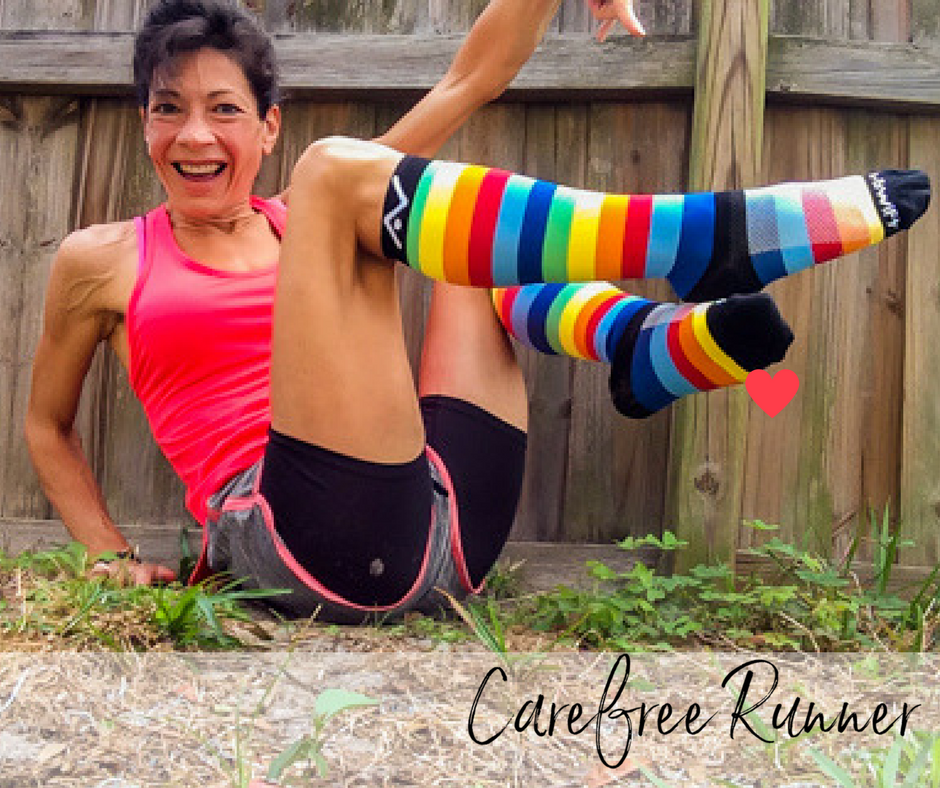
I bought some fun new socks. To fix everything.
If I exclude the initial period of my injury, when I felt like this was going to be a short term easy fix and the time I spent with my Physical Therapist, I spent most of my time as in injured runner feeling absolutely miserable.
I didn’t want to drag other people down with me so I tried to avoid places where running discussions take place when I felt that way.
It’s lovely that others take the time to stop and tell you to look on the bright side. They sincerely want to help you feel better. Running would have made me feel better and I couldn’t do it. And exactly what bright side is there to being injured? I haven’t figured that out yet, but if I do, I’ll be sure to let you know.
It was only after I started to feel better and hopeful again that I realized part of what made it so hard is living in a world where we feel like everyone has to be smiling and looking at the bright side.
“It could have been worse.” Well yes, of course it could. But that doesn’t make me feel better right now and isn’t helping speed up my recovery.
You may be an injured runner, but you know your body better than anyone
Trust your instincts. When trying to get to the root of the injury, get a second opinion if you don’t feel the first one got to the core of the problem. Be insistent. You are the only one who lives in your body. If your back hurts and they are treating your knee, ask why. Ask what the connection is and get your medical professional to explain it to you. If it doesn’t sit right, don’t feel bad about consulting with someone else. Do not allow anyone to dismiss your concerns. Don't allow anyone to make you feel like you're just another injured runner. You are more than that.
Make sure that you are getting more than just the symptoms treated. I don’t want a patchwork job on my body. I work damn hard to take care of myself. If something is broken, I want more than duct tape and well wishes.
Ask. Make it clear that you need to find the cause of the problem. I understand that symptomatic relief is important and I’ll take it; but not without working at the real problem as well.
Had I done this from the start, I could have been running again within a couple of weeks. I could have saved myself a lot of frustration and a considerable amount of time and money. My husband and daughter would also have been spared from my rapidly declining mood.
Use your time
It’s hard, but find somewhere to channel your frustration. If running is a big part of your life, don’t try replace it. There is no satisfying substitute when all you want to do is run. That doesn’t mean you can’t use the time you usually spend with running, foam rolling and anything else related to doing what you love. It really does help to try and keep your mind occupied. But trying to replace running when with something else when you can’t do it and you want to, is like getting told you can’t have chocolate but you can have some apple slices instead. It just doesn’t quite hit the spot the same way.
Aside from doing my stretches and mobility work, I lost interest in doing anything else. It just reminded me of the big hole in my routine and I didn’t know how to fill it. I could have spent that time invested in family, catching up with old friends, spending more time with the dogs or anything useful. But I didn’t want to do anything.
How my experience as an injured runner has affected me
I’ve been back on my feet for over a month now and I’m almost back to where I was before I started marathon training. I look at running differently now.
I’ve always taken a bit of a casual approach to my runs, just doing what I feel like doing each day. That does also include pushing my limits and trying to see how much faster or farther I can run. I’ve never been a slave to the numbers on a Garmin or Runkeeper or any other tracking system.
I enjoy looking at them to see how I performed and how I’m improving or if it looks like a bit of a cutback week is necessary.
But I entered this year with a few goals and many of those opportunities came and went while I was sitting at home.
I love training and I’ll be starting my marathon program again in the summer. I signed up for my next marathon, which is later this year, and I’m really excited about it. But I still have a couple of months at the time of writing this before I get to that stage.
I still run six days a week.
I love lacing up every day and I have a new appreciation for something I took for granted as part of my daily routine. It is my routine, but each day is an opportunity to go and enjoy it for what it is. So if I plan to do intervals and decide I’m not in the mood, and an easy run of undefined distance appeals to me more, that’s what I do. This happens regularly because I don’t care for speed work. I have no guilt attached to taking each day as it comes. It's pure bliss.
I am relishing the freedom of enjoying my runs, seeing my progress as I build my base mileage back up again. I have no inclination at all to try and replace any of the races I missed with others to reach goals I couldn’t chase earlier this year. It doesn’t matter. I don’t need a recorded chip time to prove that I’m healthy and happy.
I don’t have to prove anything to myself or anyone. My goals and dreams are in my control and shifting them so I can reach them is not quitting or giving them up. It simply means I’m in charge.
I’ll be ready and mentally rested when I start my new training season in the summer. I feel I’m still enjoying a bit of recovery time from my emotional anguish of the seemingly endless cycle of injury. My body is doing well. My mind is thriving on a bit of peace and simple contentment. I would love to say with confidence that this is the only time I’ll experience life as an injured runner. None of us can say this with certainty.
We can take care of ourselves and be wise in training and recovery, but stuff happens. I’m not going to worry about what I can’t control. What I can do, though, is to make sure I love every second of running right now. And I do.
Are you an injured runner? Leave me a comment and tell me about your experience. I would love to learn from you. What is the hardest or most frustrating part about being injured?
I’d also really love to hear what helped you get through the process. Tell me how you felt when you laced up and got to enjoy your first pain free run in a while. There is a running life after a running injury. And it tastes so good!
Be healthy, run happy and above all, run carefree.
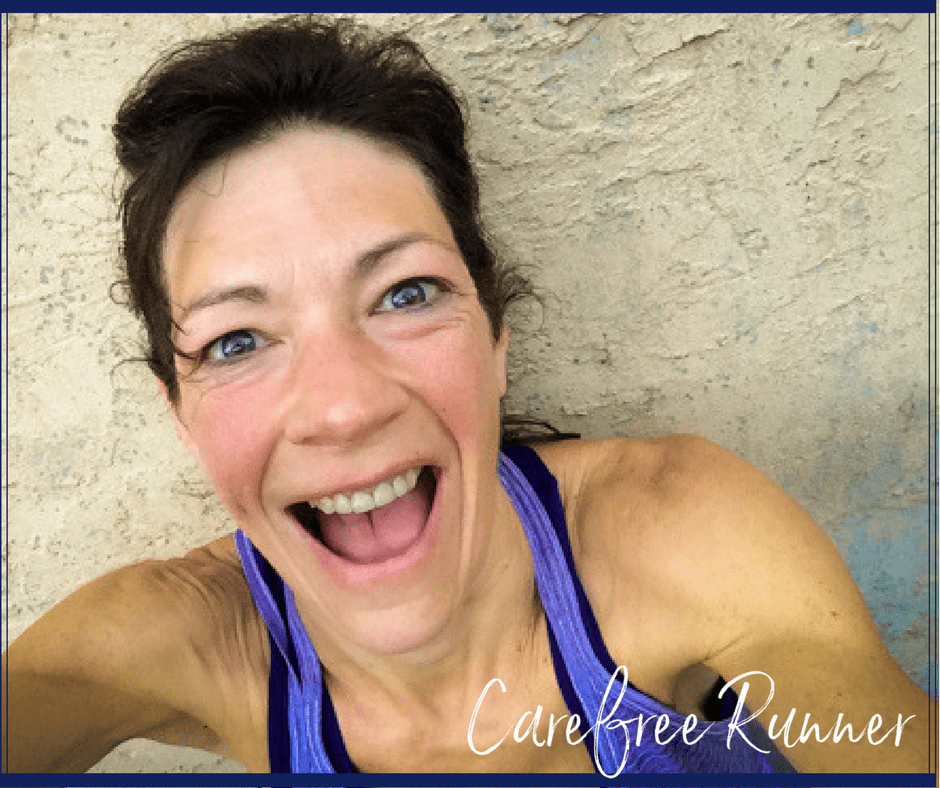
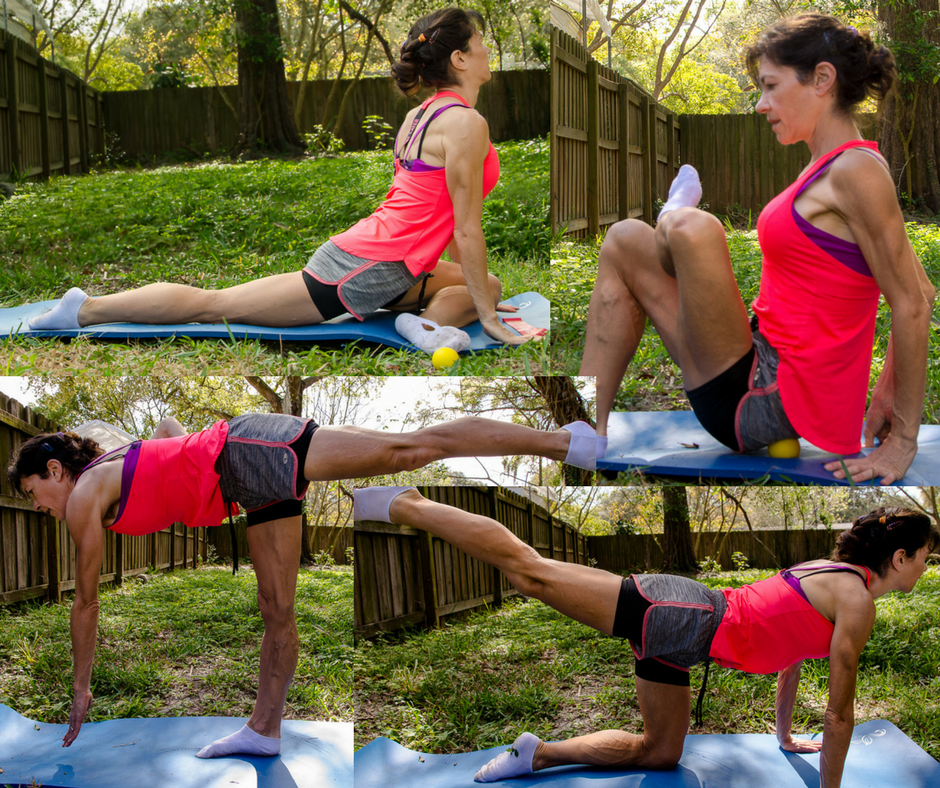
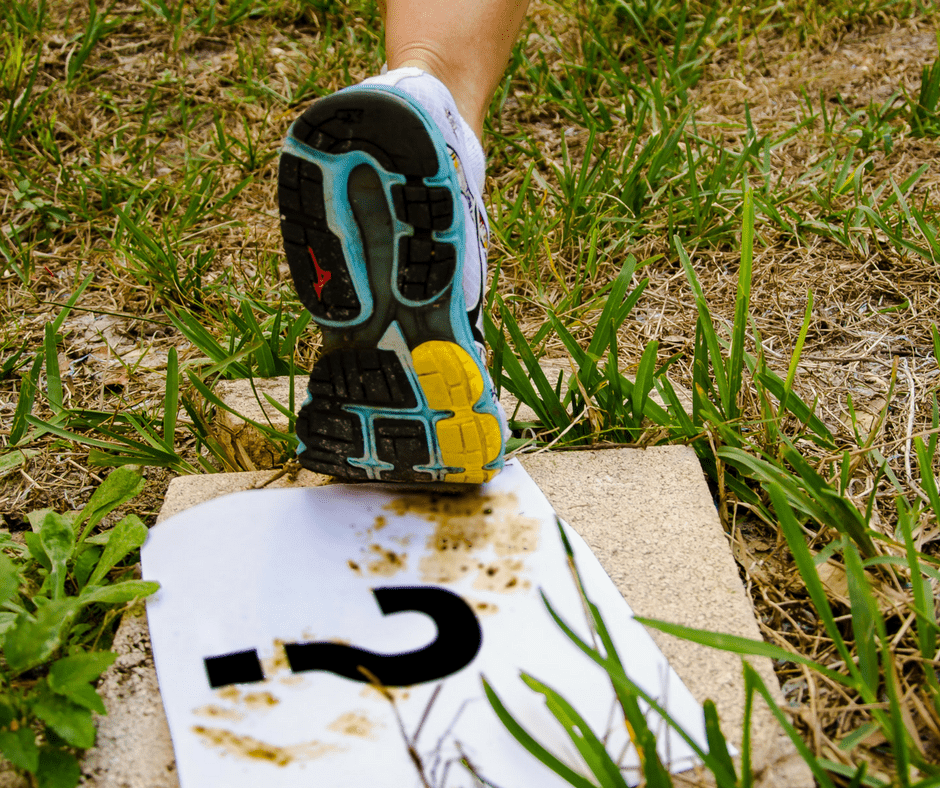
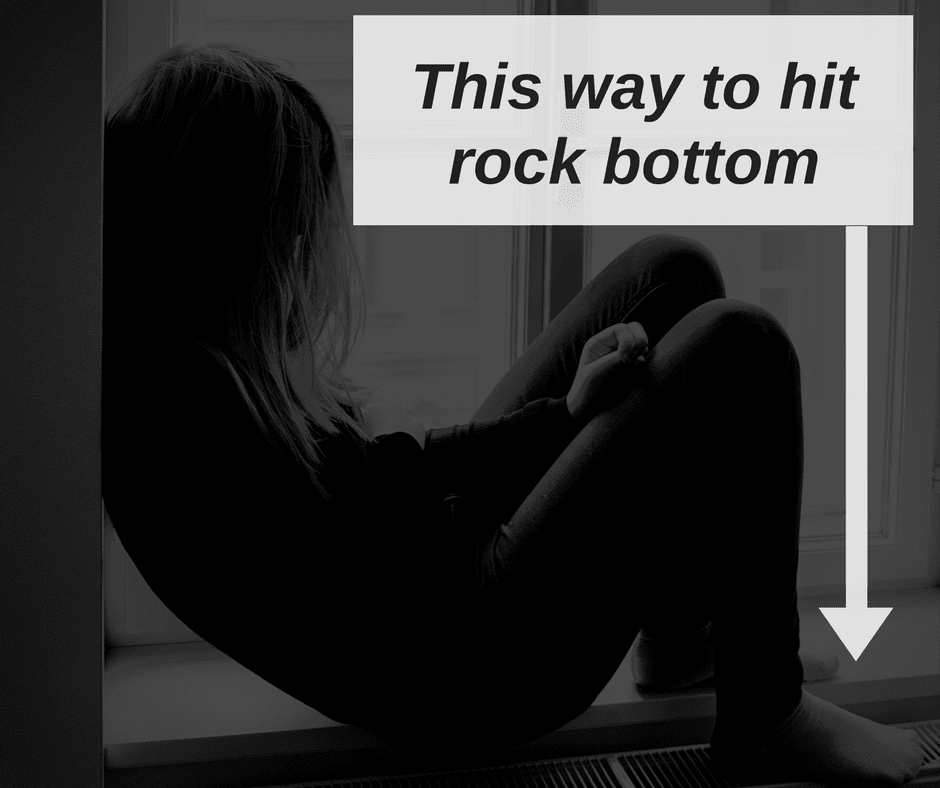
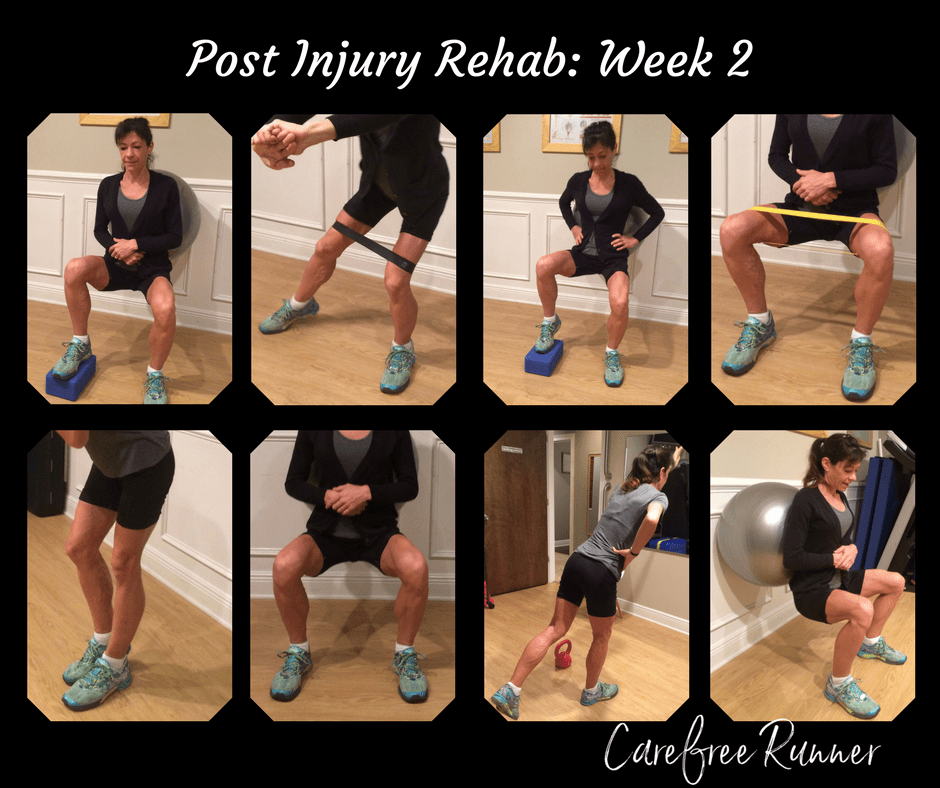
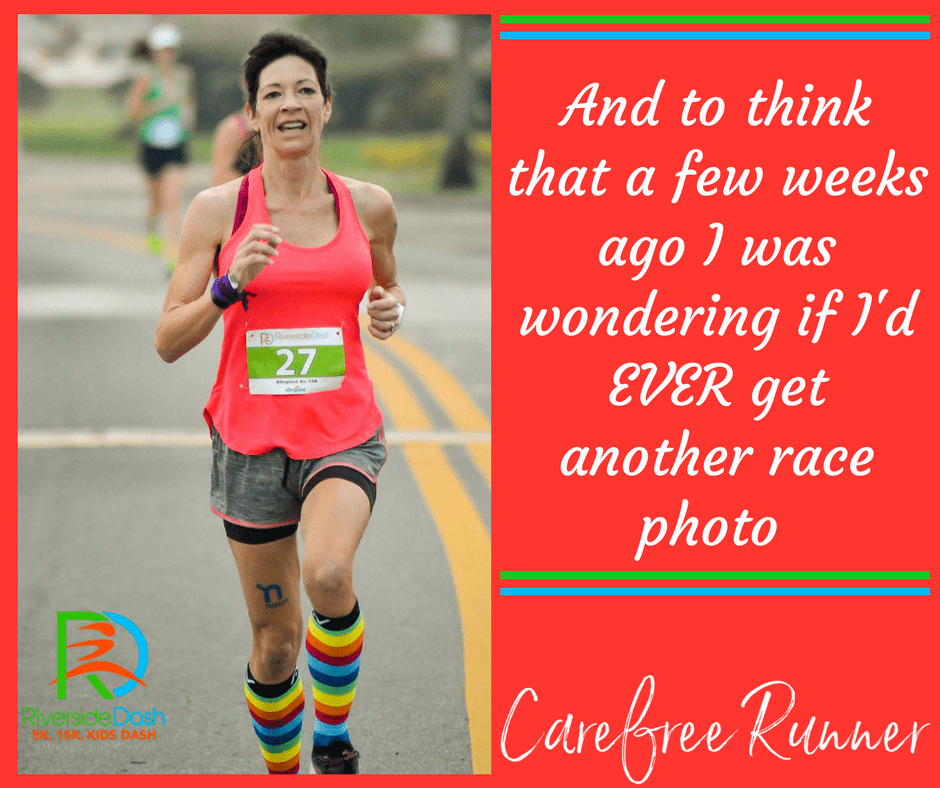


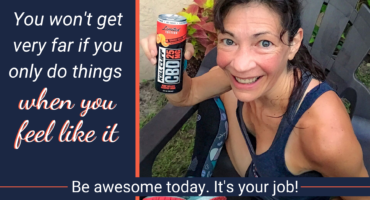
Wow! Just Wow!
Lee, you so beautifuly and eleganty described my injury and feelings. Thank You for sharing!
Spring of last year, hip flexor strain. Kept running, thought it would go away. I was 6 weeks into a 12 week marathon training program. Like you, eventually found an amazing PT and he helped me, I only lost 3 weeks (of no running) and was able to still run my race, but not for a time, just to finish.
I was an injured runner and the emotions you described fit me exactly as you described.
The biggest take away is that today, I treasure every run. Be it a race or just a few miles after work, because you never know the next time you’ll be an injured runner!!!
I’m coaching now and I think my injury was important in that it allows me to better understand the emotional side and I can better mentor my runners, that I wouldn’t be able to do had I not of been injured.
Take care and continue to Run Carefree!
I’m so glad we connected!
Rich,
Richard, thank you so much for taking the time to comment and share your experience. I found when reflecting as I started to recover that one of the hardest things to manage was that isolation. Most of us runners are a happy bunch and we love to be positive because we just love what we do and learn to suck up the rough runs and move on. We aren’t so skilled at figuring out how to take care of ourselves without our wonderful running vice though. I’m very wary of telling an injured runner to cheer up now. I know how it can just add salt to the wound. I agree with you that this has certainly given me a whole new level of empathy when it comes to others going through an injury or anything that sidelines them from running. Had I known then what I do now, I would have handled my time out (which wasn’t really the eternity it seemed!) so differently.
I’m glad you’re back and you got to run your race. I think we both have an exciting season ahead of us.
Thank you so much for sharing your experience. I realize this is an older post, but it really spoke to what I’ve been going through. I am (was) an avid runner. A year ago I started with pain in my neck/spine that forced me to stop running. It’s a long story, but it took months to finally get a correct diagnosis. I have a herniated cervical disc at C-5 C6. I haven’t been able to run in over a year. I’m in pain daily and it has been so hard on me. Running was my passion. It was who I was. It was my stress relief. My me time. My social time with running friends. I’ve struggled a lot over the past year. I don’t know if I’ll ever be able to run again, and this is really hard. Knowing that other people have experienced something similar is helpful. It makes me feel less alone.
Hey Ashley
Thank you for commenting. I’m so sorry to hear about your struggle. No matter how old injury stories and blog posts are, there’s always someone struggling with all the heartache that goes with the sidelining. I always find the not knowing “if or when” is the hardest part. At least when you have dates or a set of instructions or conditions to follow there’s some clarity. The social aspect is also particularly hard when everyone else ‘carries on without you’. There’s a guy who’s been a dedicated runner on the local paved trails since long before I started running. He was hit by a car in December last year and suffered whiplash and spinal injuries and he still goes out, but he is walking only. He said it’s just so disheartening.
It also helps if you can find something that are are safely able to do. Some people like walking. Some don’t. You may have limitations with gym or weights with your injury, but ask if there are exercises safe to do. Setting yourself a goal for somethig you never thought you would do often gives a point of focus. I’ve had to do this since writing this post (not a running related injury, but broke my foot doing something stupid a couple of years ago!). I couldn’t run for a few months, but as I had no other injuries, I was able to do most everything in a gym and modified some of the exercises where necessary. I enjoyed it, but it’s not a substitute for running. Once I accepted that and my head got around the fact that this was not a replacement for running, somehow the natural comparison took my mind of trying to get the same experience I did from my runs. I pray you get some answers and that you do get a full recovery. Just remember, you are not alone. And you are still a runner!